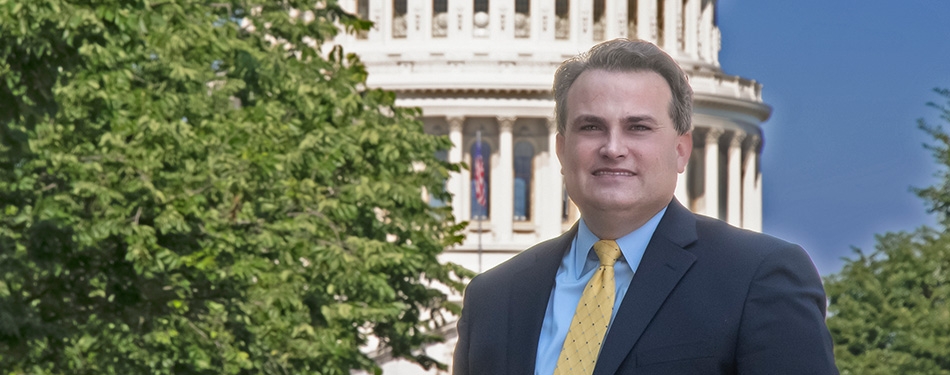Distinguished administrative law scholar Christopher Walker joins Michigan Law faculty.
Christopher Walker, a leading administrative law scholar who has worked in all three branches of the federal government, has joined the University of Michigan Law School as a professor of law.
“The University of Michigan law faculty includes some of the deepest thinkers on administrative law, regulation, and separation of powers, and it’s a thrill to now be a member of this dynamic group,” said Walker.
Walker earned his JD from Stanford University in 2006, the same year he also captured a master’s degree in public policy from Harvard University’s John F. Kennedy School of Government.
A prolific scholar with three-branch research and practice experience
Over a decade-long run on the faculty at The Ohio State University Moritz College of Law, Walker cemented his status as an expert on administrative law, regulation, and law and policy at the agency level.
I like to get into the bureaucratic trenches, meet agency officials, and understand how federal agencies work in the real world.
From 2012 to 2022, he published more than 40 articles and essays on topics such as administrative adjudication, agency rulemaking, Chevron deference, and qualified immunity, a prolific scholarly output that made Walker one of the most frequently cited sources on administrative law.
His 2016 article “Legislating in the Shadows”—a detailed study of federal agencies’ deep involvement in legislative drafting for the University of Pennsylvania Law Review—earned the American Association of Law Schools Scholarly Papers Competition Award.
In addition, Walker has served on the Administrative Conference of the United States—the independent federal agency charged to improve administrative processes and procedures among federal agencies—and chaired the American Bar Association’s Section of Administrative Law & Regulatory Practice.
He also helped launch the Yale Journal on Regulation Notice and Comment blog, for which he remains a regular contributor.
“Administrative law is a fascinating field because it affects us all on a daily basis given that the vast majority of federal lawmaking today happens at federal agencies,” said Walker.
His forthcoming book, Constraining Bureaucracy Beyond Judicial Review, offers analysis of how the United States might rethink administrative law in light of the fact that most agency actions never make it to court.
Congressional and agency staff regularly call upon Walker for training, feedback, and service.
In 2017, for example, Walker served on the Senate Judiciary Committee, working on the Supreme Court confirmation of Neil Gorsuch as well as on regulatory reform legislation for Sen. Orrin Hatch (R-UT).
Ohio’s two U.S. senators, Sherrod Brown and Robert Jones Portman, meanwhile, summoned Walker to serve on and later chair a bipartisan judicial advisory commission tasked to fill 10 federal district court vacancies in Ohio.
Walker’s scholarship also helps courts review and elected officials understand government agencies ranging from the Environmental Protection Agency and the Federal Aviation Administration to the Department of Homeland Security.
“I like to get into the bureaucratic trenches, meet agency officials, and understand how federal agencies work in the real world,” Walker said.
Prior to entering academia, the Las Vegas native worked at a litigation boutique in Washington, D.C., as well as on the civil appellate staff at the U.S. Department of Justice, where he represented federal agencies in a variety of regulatory contexts.
He also clerked for U.S. Supreme Court Justice Anthony M. Kennedy, a particularly eye-opening experience.
“For one year, I got to be a fly on the wall and see how the judiciary works at the highest level,” Walker said.
Providing classroom and real-world experience for the next generation
These diverse experiences inform and inspire Walker’s scholarship and teaching, including efforts to help students land opportunities in state and federal government.
As director of the Moritz Washington, D.C. summer program for nine years, Walker helped place more than 150 students in internships in and around the nation’s capital.
At Michigan Law, Walker will teach courses on administrative law, civil procedure, constitutional litigation, legislation and regulation, and federal courts.
He enjoys pushing students to understand both law and policy considerations, as well as the strategic choices advocates must make to represent clients and their broader interests.
“In this way, they can bring about change beyond their direct client,” he said.
Walker’s commitment to thoughtful scholarship and teaching excellence has not gone unnoticed.
Last March, the Federalist Society for Law and Public Policy Studies awarded Walker the prestigious Joseph Story Award. Named in honor of the former Supreme Court Justice, the award recognizes a young academic with a demonstrated excellence in legal scholarship and a commitment to teaching who has also made a significant public impact to advance the rule of law in a free society.
“As a teacher and a scholar, my overarching goal has been to identify and magnify voices and ideas such that every perspective is heard and examined,” he said.
—Daniel P. Smith

